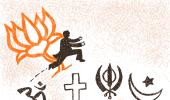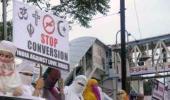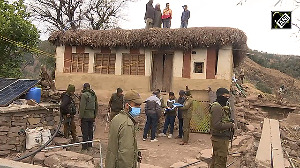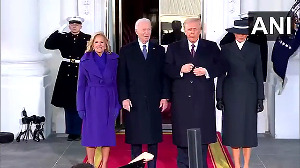It is unusual in democratic countries two decades into the 21st century for laws to become regressive instead of progressive.
But that is clearly what is happening in India today and more of this is ahead, asserts Aakar Patel.

The controversy about Sameer Wankhede's Scheduled Caste certificate gives us the opportunity to examine two issues.
The first is reservations and the second is religious freedom.
On reservations, India allows Hindu, Sikh and Buddhist Dalits access to Scheduled Caste reservation but not Christian and Muslim Dalits.
A committee set up by the previous government and headed by former Justice Rajinder Sachar recommended that reservations be extended to all Dalits, including Muslims, but this recommendation has not been implemented.
Muslims, of course, today have no political agency in India and cannot make demands such as reservations; they are busy staying out of jail or avoiding being brutalised on the streets.
India gives all Scheduled Tribe individuals, including Muslims and Christians reservations under the Scheduled Tribe category.
And, of course, the OBC or other backward classes reservations are also available to Muslims and Christians.
It is only the Scheduled Caste category, in which Sameer Wankhede applied, that is denied to them.
Wankhede's father was Dalit and mother a Muslim.
It is alleged that he himself is a Muslim and therefore his application under the Scheduled Caste category is invalid.
Dalits and Adivasis who convert are vulnerable, because the State insists on registering them on certificates as 'Christian Adivasi' making it difficult for the individuals to then access their rights including reservation.
In Gujarat, some Dalit converts to Christianity officially retain their Hindu faith, and therefore their caste and status, a process the church condones under a doctrine called occult compensation.
This term refers to the action of an individual seeking to recover their losses through an extra-legal act.
In this instance, the use of stealth by Dalits to claim their right from a state which is denying it to them unjustly.
The BJP government actively goes after Gujarat's Dalit and Adivasi Christians on the issue of reservations as a way of blocking conversions.
On March 7, 2011, the Gujarat high court rejected a Dalit's access to benefits he had earlier received after the government claimed he had converted.
The court said that the man, Nimesh Zaveri, and his families would cease to enjoy their rights as Dalits despite having a certificate issued by the government.
People may not know that the conversion of Scheduled Caste and Scheduled Tribe individuals (and also women) attracts a harsher punishment than conversion of other individuals.
After 2018, BJP states began passing harsher laws that prevent conversions especially linked to marriage.
India is a conservative cultural society.
The majority of families follow religious practices and traditions at home and it is unusual to have two people with different religions in the same family.
It is theoretically possible for two people of different faiths to marry through something called the Special Marriage Act but it has its own problems which we need not go into here.
The first of the new 'love jihad' laws was the Uttarakhand Freedom of Religion Act, 2018.
It is unusual in that it says that people who convert to Hinduism (which is called as 'ancestral religion') are excluded.
Meaning a Hindu cannot convert to Islam to marry but a Muslim can become Hindu for the same reason.
The Uttar Pradesh Vidhi Viruddh Dharma Samparivartan Pratishedh Adhyadesh, 2020 has reversed burden of proof.
The testimony of an adult woman who says she has changed her faith of her own free will is insufficient evidence and the family she marries into must satisfy the police that they have not coerced her.
The Madhya Pradesh Dharma Swatantreya Adhyadesh, 2020 punishes conversion through marriage by 10 years in jail.
It also nullifies such marriages even if the couple has children.
The Gujarat Freedom of Religion (Amendment) Act, 2021 also has a 10 year jail sentence.
Other BJP states including Karnataka and Haryana have promised similar laws soon.
It is unusual in democratic countries two decades into the 21st century for laws to become regressive instead of progressive.
But that is clearly what is happening in India today and more of this is ahead.
Indians have the fundamental right to 'freely to profess, practise and propagate religion'. Propagate means to spread.
In the Constituent Assembly, this right was debated fiercely on behalf of Christians as part of their right to convert.
Dr Ambedkar's original draft submitted to the Constituent Assembly's committees bore the words: 'right to profess, to preach and to convert, within limits compatible with public order and morality'.
He did not comment after the word was changed to propagate because he was satisfied that propagate meant the same thing as convert.
Today there is no right to propagate or convert in India.
To do so one has to fill out a form and it is for the State to determine whether one can change faith or not.
This makes it one of the many peculiar things about our secular democracy.
The right to 'freely profess, practice and propagate religion' is at once a fundamental right, meaning one that enjoys a high degree of protection from State encroachment, and also a criminal offence.
Aakar Patel is a columnist and writer and you can read Aakar's earlier columns here.
Feature Presentation: Aslam Hunani/Rediff.com











 © 2025
© 2025